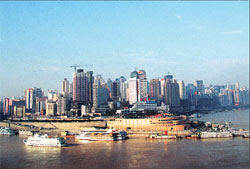Chongqing going all out to boost growth
By Wang Yi (China Daily)
Updated: 2007-04-16 08:43
Updated: 2007-04-16 08:43
|
A partial view of Chongqing Municipality. With an optimized industrial layout, the southwestern municipality by the Yangtze River seeks to build itself into a regional economic hub. |
The youngest municipality directly under the Chinese central government which used to be part of Southwest China's Sichuan Province before being designated as the fourth directly governed city in 1997 quadrupled its industrial sales revenues to 420 billion yuan in 2006 from 100 billion yuan 10 years ago.
The figure is projected to reach 500 billion yuan this year, Executive Vice-Mayor Huang Qifan said.
The municipal government's optimistic outlook stems from the city's optimized industrial structure, favorable investment environment and an influx of investment projects.
Through years of intensive industrial restructuring, Chongqing has eased its dependence on the automobile and motorcycle sectors.
The municipality has five pillar industries at present, covering power and energy, automobiles and motorcycles, machinery and equipment, heavy chemicals and high technologies.
During the 11th Five-Year Plan period (2006-10), industrial investment in the city is expected to exceed 600 billion yuan, with about 75 percent of the capital estimated to flow into the five pillar sectors, said Huang.
Instead of being scattered, the city's industrial companies are being set up in clusters in a number of industrial parks.
The parks provide effective platforms for industrial development, Huang said, adding that the municipal government will strengthen its efforts to speed up the construction of such specialized parks and improve the industrial layout of the city.
Key projects
Key investment projects play a pivotal role in spurring growth of the local economy, Huang noted.
High on Chongqing's agenda this year is setting up 10 projects of at least 5 billion yuan investment value each, 30 projects with investment value exceeding 1 billion yuan each, as well as a batch of infrastructure projects worth 100 million yuan each, Huang said.
Among these, a chip project invested by ProMos, a globally leading producer of dynamic random access memory, has been given top priority.
The Taiwan-based producer signed an agreement worth more than 900 million yuan in investment value with the local government early this year, promising to set up 8-inch (20.32-centimeter) chip production facilities in Chongqing.
It will be the first 8-inch chip production facility invested by a Taiwan company in Chinese mainland, and is expected to be put into operation in the second half of this year.
The Chinese mainland has a great demand for chips and also provides enormous resources for the development of the global information industry, International Finance News cited ProMos Board Chairman Chen Minliang as saying.
Vice-Mayor Huang said the municipal government values the scale and quality of the chip project, adding that it was expected to stimulate growth of related industries in Chongqing and its neighboring regions.
The municipal government has planned to select such investment projects of significance to the local economy as its No 1 project each year and extend priority support to it.
In June alone, 523 projects are expected to become operational, generating a total output of about 36 billion yuan.
Favorable environment
To build a favorable investment environment, Chongqing has planned to increase its energy supply and transport capacity, according to a development plan formulated by the municipal government.
With a newly installed power generating facility supplying more than 2 million kilowatts, the city's current generating capacity has reached 8.2 million kilowatts.
The figure is projected to exceed 9 million kilowatts at the end of this year.
While Chongqing's natural gas supply amounts to roughly 4 billion cubic meters, its coal output is expected to exceed 40 million tons in 2007, up 9 percent year-on-year.
Further, the transport capacity of the city will improve substantially with the opening of the Chongqing-Huaihua railway and the completion of the Three-Gorges project along the Yangtze River.
In addition to infrastructure expansion, diversified financial channels also score points with investors.
China Development Bank, which has pledged loans worth 16 billion yuan to support Chongqing's pillar sectors, established the Three-Gorges Reservoir Area Guarantee Firm last year in collaboration with Yufu Group, a local company.
With the help of the guarantee firm, reported to be the biggest in the country, companies in the area of the Three-Gorges Reservoir are expected to secure financing worth 20 billion yuan in the next two years.
Chongqing Commercial Bank, Rural Credit Cooperatives of Chongqing, as well as branches of Industrial and Commercial Bank of China, Agricultural Bank of China and Agricultural Development Bank of China will finance 11,000 small and medium-sized enterprises (SMEs) with 80 billion yuan in loans over the next few years.
To further address financial difficulties faced by SMEs, five to 10 credit guarantee institutes will be established this year, to provide guarantee for 20 billion yuan worth of loans.
The municipal government encourages SMEs to participate in equity restructuring of big corporations.
Capitalizing on a strong bull trend in China's capital markets, local publicly traded companies are estimated to collect funds amounting to 20 billion yuan in 2006 and 2007.
The private sector is another focus of the municipal government.
All investments, whether State-owned or private-funded, local or offshore, big or small-sized, enjoy national treatment policy and are subject to the same criteria in the approval procedures.
Beginning this year, the municipal government has lifted the threshold for payment of the administrative fee imposed on individual business by up to 3,000 yuan of revenue per month from 600 yuan in the past.
The measure will exempt at least 200,000 individual merchants from paying the administrative fee and help build a relaxed business environment, Huang said.
(China Daily 03/29/2007 page18)
|
||
|
||
|
|
|
|
